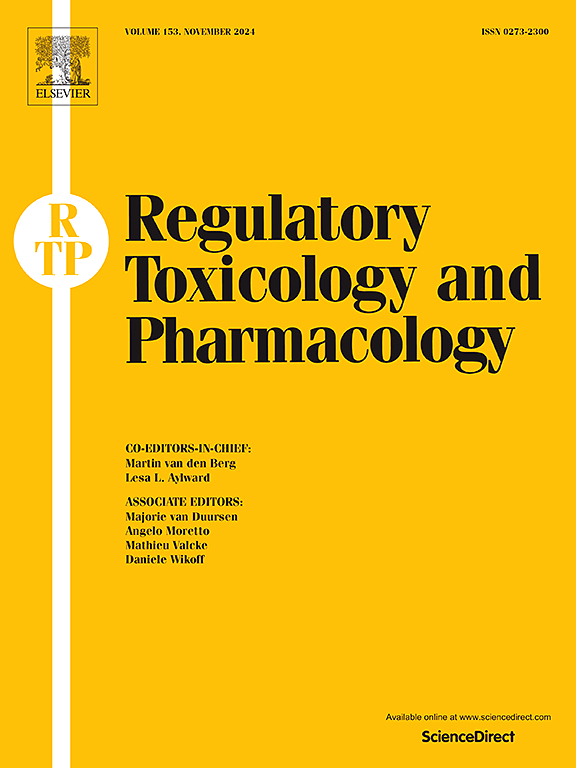3个月重复剂量毒理学研究对肿瘤适应症的T细胞接合剂的开发有多大用处?
IF 3.5
4区 医学
Q1 MEDICINE, LEGAL
引用次数: 0
摘要
用于肿瘤适应症的T细胞接合物(TCEs)的发展主要由ICH S6和S9调控。研究性新药申请通常需要在相关动物物种中进行为期1个月的毒理学研究。在注册临床试验开始之前,对同一品种进行为期较长的毒理学研究,通常为3个月,以支持营销。由于抗药抗体的发展可能会阻碍动物物种中人类特异性生物制剂的长期研究,而且TCEs是速效分子,因此我们分析了一些TCEs 3个月毒理学研究的价值。我们提供了4个TCE项目为期1个月和3个月的毒理学研究数据,并描述了我们与监管机构的互动。在所有病例中,3个月的研究都没有揭示新的信息来进一步影响各自的临床开发计划。考虑到药物开发中的3r(替代、还原和改进),我们强调,3个月的tce研究并不总是提供额外的安全性见解。因此,应评估替代战略,并根据3r仔细考虑进行为期3个月的研究,并与卫生当局逐案讨论。本文章由计算机程序翻译,如有差异,请以英文原文为准。
How useful are 3-month repeat-dose toxicology studies for the development of T cell engagers for oncology indications?
Development of T cell engagers (TCEs) for oncology indications is regulated mainly by ICH S6 and S9. Investigational new drug applications are usually supported by a 1-month toxicology study in a relevant animal species. Before the start of registrational clinical trials, a longer-duration toxicology study, typically 3 months, is performed in the same species to support marketing. As longer-term studies with human-specific biologics in animal species can be hampered by development of anti-drug antibodies and TCEs are quick-acting molecules, we analyzed the value of 3-month toxicology studies for some of our TCEs. We present data from 1- and, where applicable, 3-month toxicology studies for 4 TCE programs and describe our interactions with regulatory agencies. In none of the cases did the 3-month studies reveal new information to influence further the respective clinical development plans. Considering 3Rs (Replacement, Reduction and Refinement) in pharmaceutical development, we highlight that 3-month studies with TCEs don't always offer additional safety insights. Therefore, alternative strategies should be evaluated and conduct of 3-month studies carefully considered in the light of 3Rs and discussed case-by-case with health authorities.
求助全文
通过发布文献求助,成功后即可免费获取论文全文。
去求助
来源期刊
CiteScore
6.70
自引率
8.80%
发文量
147
审稿时长
58 days
期刊介绍:
Regulatory Toxicology and Pharmacology publishes peer reviewed articles that involve the generation, evaluation, and interpretation of experimental animal and human data that are of direct importance and relevance for regulatory authorities with respect to toxicological and pharmacological regulations in society. All peer-reviewed articles that are published should be devoted to improve the protection of human health and environment. Reviews and discussions are welcomed that address legal and/or regulatory decisions with respect to risk assessment and management of toxicological and pharmacological compounds on a scientific basis. It addresses an international readership of scientists, risk assessors and managers, and other professionals active in the field of human and environmental health.
Types of peer-reviewed articles published:
-Original research articles of relevance for regulatory aspects covering aspects including, but not limited to:
1.Factors influencing human sensitivity
2.Exposure science related to risk assessment
3.Alternative toxicological test methods
4.Frameworks for evaluation and integration of data in regulatory evaluations
5.Harmonization across regulatory agencies
6.Read-across methods and evaluations
-Contemporary Reviews on policy related Research issues
-Letters to the Editor
-Guest Editorials (by Invitation)

 求助内容:
求助内容: 应助结果提醒方式:
应助结果提醒方式:


